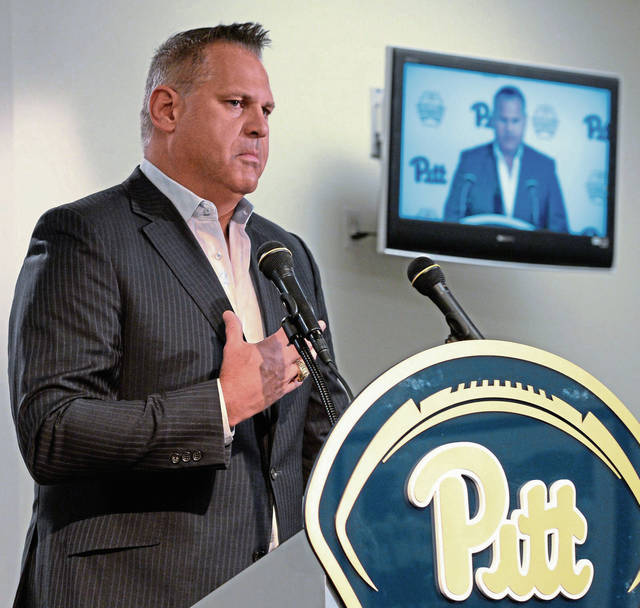How Jimbo Covert ended up at Pitt on his way to the Pro Football Hall of Fame
Share this post:
When Jimbo Covert was a senior at Freedom High School in 1977, he attracted interest from some of the finest college football programs in the land, Pitt and Penn State among them.
The truth: The future Pro Football Hall of Famer never seriously considered going anywhere but Pitt.
Penn State?
“Penn State didn’t really recruit me that hard,” Covert said to reporters last month in advance of his induction Saturday into the Pro Football Hall of Fame’s Centennial class. “I just think in those days Penn State felt they could show up and get anyone.”
Actually, Penn State had little trouble luring some of the best high school players to State College during a 19-year stretch (1968-86) when the Nittany Lions won two national championships and 10 or more games per season 13 times.
Covert said he remembers seeing Penn State assistant coach Bob Phillips once during his senior year.
“They called me into the office and he said, ‘Are you ready for your visit (to Penn State)?’
“I said, ‘No, coach, I’m going to go to Pitt.’
“He said, ‘OK.’
“I thought, ‘That was easy.’
“That night I got a call from coach (Joe) Paterno, just trying to talk me out of going to Pitt.”
By that time, it was too late. Pitt was only a year removed from its own national championship, and Covert had built a strong attachment to his future teammates when he visited the campus. Then there was the Jimmy Johnson factor.
Johnson, in his final season as a Pitt assistant, wore a path from Oakland to Beaver County to keep in constant contact with Covert.
“Jimmy Johnson was at my high school practically every other day,” Covert said.
That’s why Covert calls Saturday “a little bit of a homecoming.” Johnson will be inducted into the Centennial Class on Saturday, along with Covert.
Pitt was Johnson’s seventh and final assistant’s job before he left after the 1978 season to embark on a head coaching career that took him from Oklahoma State to Miami (where he won a national championship) to the Dallas Cowboys (where he won two Super Bowls) and, finally, to the Miami Dolphins.
Johnson and Covert, who won a Super Bowl with the Chicago Bears after the 1985 season, have been winners after football, too.
Covert is a successful businessman and a member of Pitt’s Board of Trustees. Johnson has had a long career in television as an NFL analyst.
Both men keep a close eye on the state of the game, and Covert said it hasn’t changed dramatically in the three decades since he retired.
“There are a lot of tough guys in the NFL right now. I don’t think that really changed,” he said. “I think what changed is protecting the players a lot better, which I think is really important. It’s made the game safer and is a good addition to it.”
He remembers the six weeks of two-a-day drills during summer camp.
“That really beats you up a little bit,” he said. “Nowadays, they don’t do that. Our training camps were hard. They were tough, and they were survival of the fittest. You were already hardened when the season started.
“Maybe that’s why you saw a little bit better play early in the season back then than you see now because guys just aren’t hitting as much in training camp. But, let me tell you, there are some tough guys out there. I’d love to be teammates with the guys who are playing today.”
Covert played eight seasons in Chicago, but he sports his Pittsburgh roots proudly.
“I’m still a huge Pittsburgh Steelers fan,” he said. “Roberto Clemente and Joe Greene were my two heroes. Joe Greene was the best football player I ever saw. I wanted to line up next to him. As a kid, I used to dream about that. That’s why I wore 75 in high school.
“I look at Chicago very similar to Pittsburgh. It’s just much bigger. You have a lot of ethnic neighborhoods, different types of people who all live together. Hard-working people who wanted to relate to someone like me who came from Western Pennsylvania (with) a steel mill kind of worth ethic.
“A lot of things you learn in sports — hard work and dedication and leadership — are very transferrable skills. It’s worked for me, and I think it’s worked for a lot of guys who played in the NFL.”


